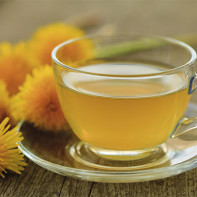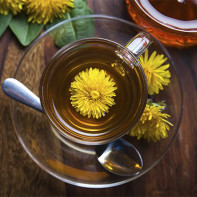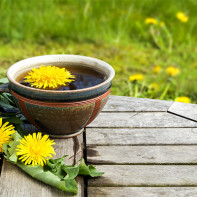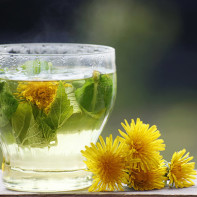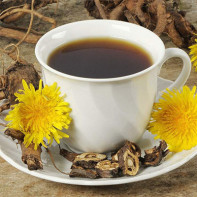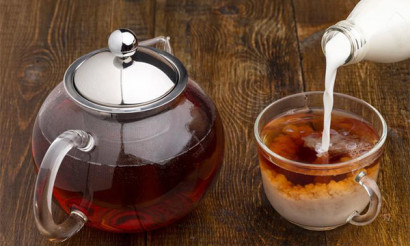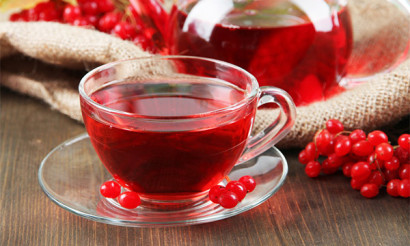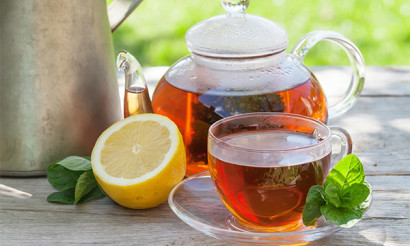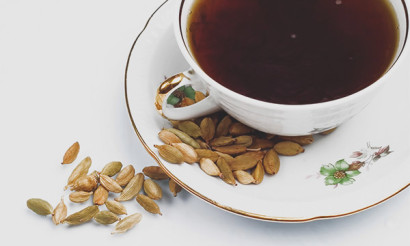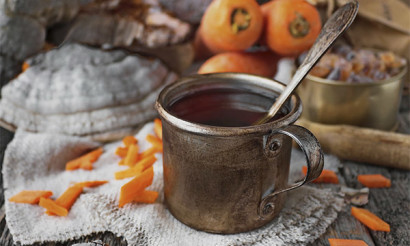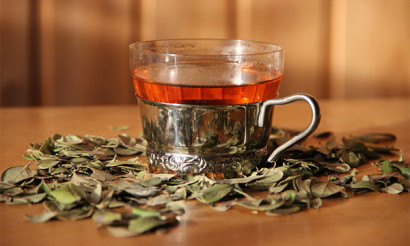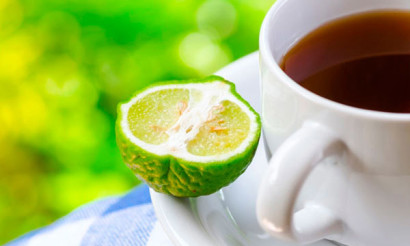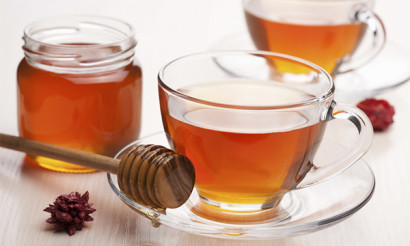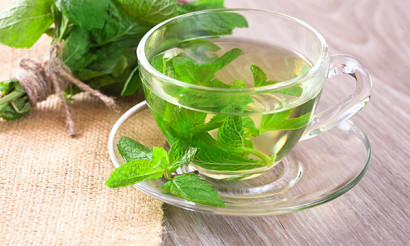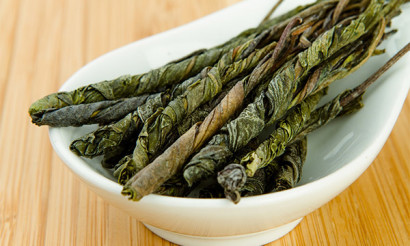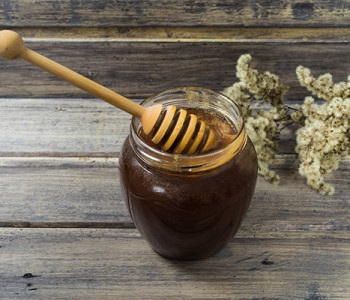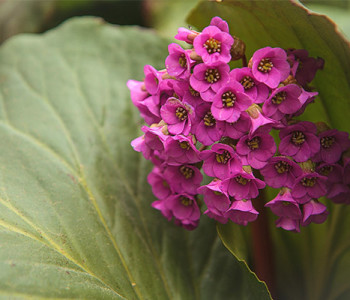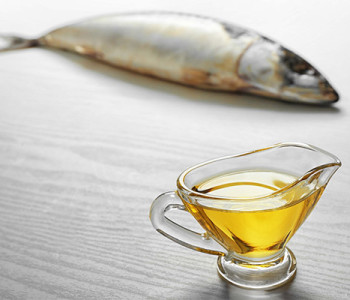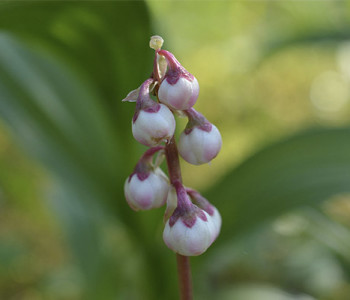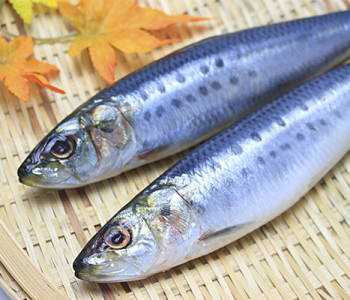Dandelion Tea: Health Benefits
Dandelion is a perennial herb that grows extensively in Russia. The official name of the plant - Taraxacum, comes from the Arabic or Persian name for the flower "Taruhshakun." You can also often hear its popular name: euphorbia, soldiers, cow flower, milky color, parachute.
- Composition and calorie content
- Useful properties of dandelion tea
- General benefit
- For women
- For men
- During pregnancy
- When breastfeeding
- For children
- When losing weight
- How to drink with various problems
- Harm and contraindications
- When and How to Collect Dandelion for Tea
- How to make tea from dandelions: recipes
- Interesting facts about dandelions
If we consider the properties of dandelion from a medical point of view, it has numerous properties - tonic, choleretic, diuretic, antimicrobial, blood purifying and antipyretic. During flowering, it is widely used in cooking.
Composition and calorie content
100 grams of dandelion greens contain about 45 calories.
Plant flowers include carotenoid, which is useful for adults and children (taraxanthin, lutein, flavoxanthin form bitterness), triterpene alcohol (arnidol, faradiol), volatile oils, inulin, tannins, vitamins A, B1, B2, C, protein , iron, potassium.
Dandelion rhizome includes a large number of elements: inulin, amirin, taraxerol, tannins, potassium, choline, vitamins A, B1, C, D, fatty oil, lemon balm and linoleic acid, organic resins.
Useful properties of dandelion tea
General benefit
This plant is used in traditional medicine for the following diseases:
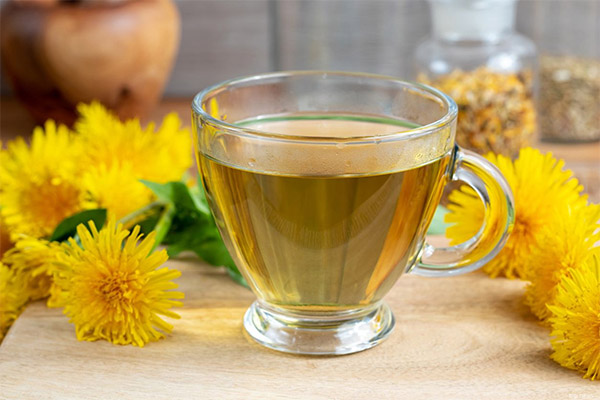
- Joint diseases. Due to its blood-purifying properties, it is ideal for the treatment of arthrosis, seasonal rheumatic pains. Dandelion tincture is used inside, as well as grinding or compresses.
- Metabolic disease. The constant intake of tea increases the production of insulin in the body, helps to regulate the carbohydrate, lipid metabolism. It is recommended to use for diabetes, thyroid problems, for weight loss and lowering cholesterol.
- Blood purifying action. Due to the presence of inulin in the plant, fees with the inclusion of dandelion are used to detoxify the body, in case of poisoning. Inulin absorbs toxins, toxins, heavy metals, radionuclides and painlessly removes them from the body. Infusion of herbs is used to treat lymph nodes.
- The digestive system of the digestive tract. A drink from dandelion has a good effect on the functioning of the intestines in case of digestive disorders, after undergoing antibiotic treatment. Medical fees are used for pancreatitis, gastritis, flatulence, constipation, colitis and kidney stones.
- Respiratory diseases, colds. Thanks to the diaphoretic, antipyretic effects of the plant, the infusion can be used with increasing temperature during respiratory diseases. With pulmonary tuberculosis, it has a slight expectorant effect.
- Stress state. It has a beneficial effect on the nervous system with stress and insomnia.
- Pathology of the genitourinary system. Due to the mild diuretic and bactericidal action, the medicinal infusion has a positive effect on inflammation of the kidneys and bladder, stone kidney disease.
In cosmetic medicine, it is widely used in the treatment of acne, boils, allergies, warts, corns.
In folk medicine, tea from the roots and leaves of dandelion is rapidly gaining popularity. Due to the high content of inulin in the plant, the drink works as a strengthening, immuno-enhancing agent. Tea from a flower perfectly supports the body as an anti-stress drink: it helps relieve fatigue, fatigue, supports the body with nervousness, insomnia, and sleep disturbances.Decoctions of the root have a light diuretic effect, remove excess water, are used to reduce weight, improve digestion, and also stimulate the production of gastric juice. The medicinal collection of the plant is used for diseases of the kidneys and gall bladder - it helps to remove stones.
For women
Regular use of the drink has a positive effect on the female body. It works not only as a mild laxative and diuretic, but also thanks to the phytohormones in the herb and helps during menstruation, relieving cramps and pain in the first days.
Drinking dandelion tea can have a positive effect on the body with such health problems: poor-quality breast tumor, liver disease, cystitis and diseases related to the genitourinary system, ovarian cysts, hormonal imbalance, menopause, polyps.
A beneficial effect was observed when using dandelion tea on the condition of the skin and complexion. The plant contains a large number of antioxidants that cleanse the body of toxins, give a slight anti-aging effect. Inulin, located in the plant, has the property of not only general detoxification, but also helps regulate the blood circulation in the body, the thyroid and lymph glands.
With skin inflammation, acne, small cuts, insect bites, tea brewing can be used. Moisten a cotton pad with infusion, apply for a few minutes to the face or body area with a cut. Tea bags with dandelion can be used to rinse hair after shampooing. Tea needs to be brewed, allowed to settle and then rinse hair. Due to the large number of vitamins A, E, C, PP and trace elements, rinsing has a beneficial effect on strengthening the hair roots, reduces dryness and skin irritation.
For men
Drinking dandelion tea has a profound effect on the male body. A drink from the roots of the plant was used in ancient times in order to increase the potency of the stronger sex. According to modern experts, trace elements in the plant, choline and plant protein contribute to the restoration of men's health. The resumption of erectile function when drinking tea helps to improve the general condition of blood vessels, rid the capillaries of atherosclerotic lesions, resume the work of the endocrine system, increase the level of testosterone in the body, and reduce estrogen. The drink has an anti-inflammatory effect on the genitourinary system. The presence of vitamins A and C in the plant normalizes muscle recovery with regular physical exertion, prevents fatigue, and general weakness of the body. Vitamin E triggers the activity of the gonads, as well as the thyroid gland. A large number of macrocells contributes to an increase in the vital activity of the sperm of a man.
With constant chronic fatigue and increased stress, dandelion tea also helps relieve stress.
In addition to the above positive effects of the drink, dandelion inflorescences and roots have an effective effect on the breakdown of cholesterol plaques, activation of cell regeneration, stimulation of urine separation, and chronic hypertension.
During pregnancy
Tea is used to strengthen the body overall if herbal medicine was started before the conception of the baby. But at any stage of pregnancy, it will be useful to take medication fees. The drink has a particularly beneficial effect on the health if the expectant mother has chronic inflammatory diseases of the genitourinary, digestive or respiratory systems.
Pregnant women are also often susceptible to colds, flu, and SARS. Usually, during this period of time, especially at the deadlines, medications - antibiotics and antiviral drugs - are prescribed with great care, as they can harm the unborn baby. In this case, traditional medicine methods, herbal treatments are perfect.
A drink from this plant helps with respiratory diseases, has a positive effect on the emotional balance of the expectant mother. Tea intake is possible as a preliminary action to prevent a predisposition to diseases, as a risk reduction and further development of pathology.
Dandelion tea is completely safe during pregnancy. In small doses, it stimulates urination and eliminates swelling. But side effects may appear - loss of appetite and nausea. Therefore, if there is a tendency to morning ailments, it is better to be wary of using tea. In any case, since it is a medicine, it is more correct to consult with your doctor before use. The fact is that during pregnancy and the subsequent lactation period, the entire female body is rearranged, hormonal imbalance may occur or the development of those diseases that are currently in a state of embryo or dormancy may worsen.
When breastfeeding
Thanks to the microelements, minerals and vitamins contained in the composition, the drink helps to increase milk production in women. Also, dandelion tea has a positive effect on the whole body: it improves digestion, calms the nerves, and inflammation of the urogenital system passes. The composition of this medicinal plant contains many minerals and vitamins that are necessary for a nursing mother.
But at the same time, dandelion tea should not be abused often, since the microelements of the plant add bitterness to breast milk, and subsequently the newborn may refuse to breast-feed. Before use, it is better to consult with the attending pediatrician, since the use of tea in large doses can, together with an increase in the volume of milk, cause an eruption in the form of an allergy on the child’s body, and upset digestion.
For children
Dandelion tea has several important properties for children. Dandelion infusion is used as an antipyretic, bringing body temperature to normal. Inflorescences of dandelion treat children's rickets, making tea from the leaves and young flowers of the plant. In the dandelion there is iodine, iron and calcium, necessary for children. Also, the presence of phosphorus in the plant has a beneficial effect on the strengthening of teeth and bones. Tea from dandelion root has an anthelmintic, antifungal effect. The positive effect of tea is very important in the very early age of the child, when other medicines, such as tablets and medicines, are contraindicated in the child's body.
It is also important to know that dandelion is contraindicated in children under 5 years of age due to a possible allergic reaction to it.
When losing weight
Dandelion is considered one of the most effective means for weight loss. The composition of plant substances that is present in the plant contains trace elements with a laxative and diuretic property. Dandelion contains a large amount of inulin, pectin, taraxasterol - all together they are stimulant and choleretic drugs and have a positive effect on the intestines. Reception of plant tea is especially effective when weight gain is associated with excess water in the body, with constant edema.In this case, it is possible to use only dandelion as the only medicine, without the use of additional drugs.
Traditional medicine recommends taking teas or infusions from dandelion roots for the process of losing weight, since it is in them that most of them contain substances that have a diuretic effect. Typically, this drink is used instead of tea or coffee. It has a natural sweetness, is low-calorie, does not contain sugar.
In addition, regular use of the drink, as was written earlier, has a beneficial effect on digestion, allowing you to quickly activate the digestive tract and intestines. The constant use of a cup of tea from this plant during or after meals will help get rid of constipation and bloating.
How to drink with various problems
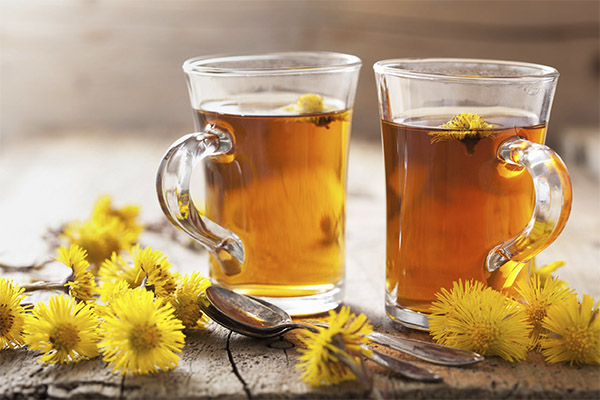
Depending on the expected effect and treatment regimen of the disease, dandelion tea is consumed in different versions, in different doses, as well as time of day. Before using tea, be sure to read the instructions. Typically, the instructions write the concentration of the plant (how many spoons, grams you need to put on a glass of water), the brewing method (water bath, reception - as a regular tea), preparation time (approximately 5 to 15 minutes infuse tea). Also indicates the temperature of consumption of the drink to achieve maximum effect. But there are general recommendations that are also better to listen to.
- For example, since tea has a pronounced diuretic effect, you should not drink it before an important event or going out.
- For children and nursing mothers, a small concentration of the drink is suitable. When breastfeeding, a woman is recommended to take tea at least half an hour before the start of HB.
- With insomnia, tea is taken 2 hours before bedtime.
- For effective weight loss, the drink is taken with food, as it actively starts the intestines.
- Decoctions with a large number of plants are taken only in tablespoons, no more than three times a day.
- For a general strengthening, immuno-enhancing effect, they usually drink tea with honey. The scheme and duration of the course is 2 weeks, followed by a break of up to three months.
Harm and contraindications
Like any medicine, dandelion has contraindications for use. Before use, it is better to carefully study the possibility of side effects. Since the composition of dandelion is rich in a large number of trace elements, vitamins, resins, in some cases this excess can be harmful to the patient. The main bans on plant consumption:
- The presence of vitamin K can lead to open bleeding. With caution, the drink should be taken after surgery, injuries, as well as pregnant women - as it affects the tone of the uterus.
- With exacerbation of ulcers, gastritis and inflammation of the stomach, the use of dandelion is excluded.
- In case of stone formation, it is better to consult a doctor before use.
- When using drugs that have an antacid effect, teas from this plant are not used.
- Tea should not be drunk with certain antipyretic tablets and antibiotics because of the risk of bleeding or poor absorption of drugs.
- Consultation with the attending physician is necessary for every patient with diabetes, since taking tea from the plant can lead to glycemia.
When and How to Collect Dandelion for Tea
Due to the large distribution area of dandelion in Russia, independent collection and harvesting of grass is possible. In this case, the main rule is to properly prepare, dry and store the drug collection. Incorrect actions at each stage can undermine further health.
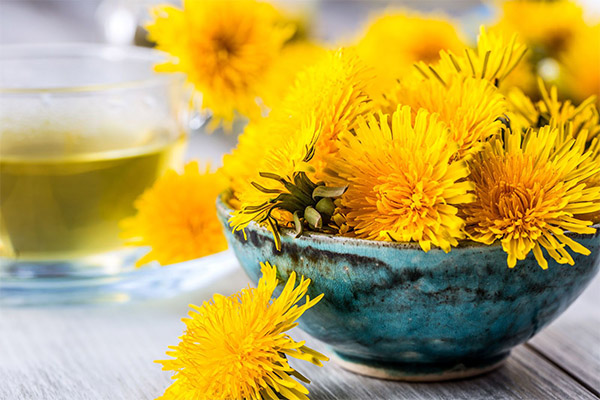
Inflorescences, leaves, and rhizome are harvested from a dandelion.Harvest is necessary when the bulk of the beneficial properties are concentrated in the plant. Depending on the part of the plant, there are several harvest periods.
Inflorescences are harvested during the main flowering - May, June. The collection is carried out only those flowers that have recently blossomed. Pick off flowers with hands, without using knives. In this case, it is also important to collect inflorescences with pollen.
Leaves are also harvested in May, early June, carefully cutting off with your hands, without using a knife and scissors.
Leaves and inflorescences are folded on a flat surface to avoid grass debate. All raw materials must be washed, without damage by insects. It is dried without direct sunlight, often tedious.
Dandelion roots are harvested in two periods: before flowering (in early spring) or in autumn, after a flowering period (September, October). The roots are also thoroughly washed and then dried in the oven or in a well-ventilated dry place.
The dried collection is collected and packaged in rag bags. Storage is carried out in a dry place. Shelf life of the drug collection: leaves, inflorescences - 2 years, roots up to 5 years.
What parts of the plant can be used
As a medicinal raw material for further use, dandelion inflorescences, leaves, and root are used. From the roots in most cases make decoctions, alcohol tinctures, ointments, lotion, coffee. From inflorescences and leaves, juice, oil, tea, and cosmetic lotion are made.
How to make tea from dandelions: recipes
There is a wide variety of recipes for making dandelion tea. For the first acquaintance with this medicinal plant, several basic, basic recipes can be distinguished.
- Increased immunity. Take 3 tablespoons of leaves and roots of dandelion, pour a liter of boiling water. Cover with a towel for slow cooling and let it brew for 10 minutes. You can drink a cup of tea before each meal.
- Weak diuretic. Take fresh dandelion leaves during flowering (May-early summer) at the rate of one teaspoon of the mixture per cup, tear them into small pieces with your hands, pour boiling water. Let stand 10 minutes, strain hot. Such tea can be drunk both hot and cold. It is rich in trace elements, fatty resins and is ideal as an immuno-enhancing agent and a weak diuretic. For sweetening, you can add honey, lemon zest.
- Strengthening the body. 6 inflorescences of dandelion to brew 300 mm of boiling water. Let it brew for 5-10 minutes. Strain, add honey to taste. This drink has a pleasant golden color, and it can be consumed several times a week.
- Losing weight. A teaspoon of the roots of the plant brew a cup of boiling water. Let stand 30 minutes, strain. Take with food. Tea activates the metabolism, acts as a laxative, diuretic.
- Joint treatment. Take 5 dandelion inflorescences, pour cold water so that the raw materials are completely closed. Put the container on fire, let the water boil, cook the raw materials for 20 minutes. Strain the cooled tea, add lemon as desired. Drink with joint pain to alleviate the condition.
Interesting facts about dandelions
Talking about the medicinal advantages of this solar plant, you can touch on some interesting facts about it.
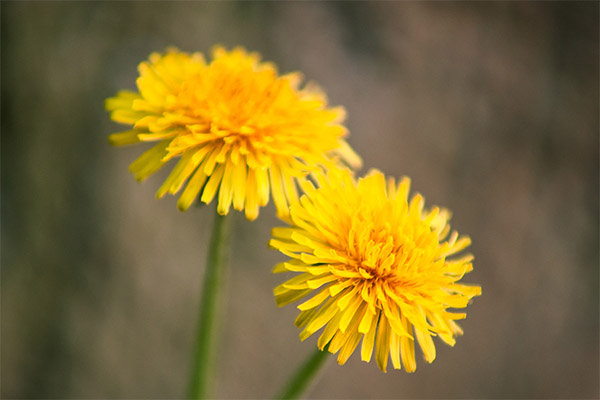
The consumption of dandelion is widely used in cooking. In Europe (France, Belgium, Germany, Italy), the plant is cultivated as a variant of green leaf lettuce. In India, whole plantations are allocated for it. The most common culinary dishes:
- A variety of salads with fresh dandelion leaves. The salad is prepared on the basis of leaves, in the future, eggs, herbs, peppers, vegetables are added at the request of the master chef. Dressing are mayonnaise, butter or sour cream.
- Pickled Dandelion. Leaves and inflorescences pickle. Next, add to salads, soups.
- Jam.From young dandelion inflorescences, yellow, sunny jam is brewed. During respiratory diseases it is a success. Candied fruits are also prepared from the flowers of the plant.
- Coffee. Coffee is made from crushed dandelion roots. Before use, the roots of the plant are fried until golden, which makes the dandelion taste like chicory. They drink such coffee with the addition of cream, cinnamon. During the war it was widely used in German troops as a substitute for classic coffee.
- Cider, wine, dandelion beer. This is a traditional classic drink in the UK.
- The juice. Juice from dandelion leaves is very popular. The benefits of the drink are not officially proven, but it is universally used for anemia, vitamin deficiency. When combined with black radish juice, it positively affects the body with inflammation of the liver, cough. In folk medicine, it is prescribed along with carrot juice for rickets in young children, for the treatment of fractures and rapid bone growth. For the elderly, it is prescribed in the treatment of joint diseases, as a prevention of bone fracture. But it is important to remember that dandelion milky juice at high doses can cause detoxification, the body is sent.
Some interesting facts about this plant include a few facts:
- For a long time, dandelion was bred for the production of rubber, since it contains rubber. At the moment, special trees are used for rubber production, but the development using dandelion juice in this direction is not completed.
- In agriculture, dandelion is considered one of the most "harmful" weeds. He discovered a great ability to regenerate and restore the population even from the smallest piece of rhizome. Like a weed dandelion is indestructible.
- Plant seeds can travel hundreds of kilometers through the air before germinating in the soil.
- A variety of dandelion grows in the Caucasus, whose petals are painted in bright red.
- On the Kola Peninsula, a species of white dandelion grows. It has white petals of inflorescences with a snow-white center inside.
- Dandelions are sometimes called the "sundial of nature." They open their inflorescences at 6 in the morning, and close at exactly 3 o’clock in the afternoon.
- In the United States, dandelion day is celebrated in early May. On the first Saturday of May, in Ohio, they prepare dishes from dandelions, decorate them with clothes.
- In China, the plant is officially recognized as a vegetable, as it is the basis for the preparation of many dishes.
«Important: all information on the site is provided exclusively in fact-finding purposes. Before applying any recommendations, consult with a profile specialist. Neither the editors nor the authors are liable for any possible harm caused materials. "

